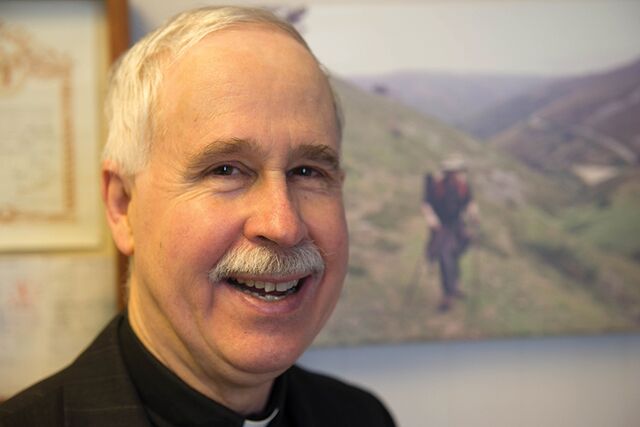by Joe Bollig
joe.bollig@theleaven.org
KANSAS CITY, Kan. — Oh, the agonies of being a columnist for The Leaven. Oh, to be haunted by the deadline while the mind is bereft of ideas.
It’s like the writer Gene Fowler said: “Writing is easy. All you do is stare at a blank sheet of paper until drops of blood form on your forehead.”
Right. But while other Leaven columnists feel the heat, longtime columnist Father Michael Stubbs is as cool as the produce section. No bleeding there.
Why? Because he writes about the Mass readings. For ideas, all he has to do is open the Lectionary.
Lest there be any misunderstanding, Father Stubbs has to exercise some thought, effort and creativity in producing his writing. His columns don’t write themselves.
But even he will admit that he has one up on columnists who have to write more broadly.
And really — how hard is it to misquote the Bible?
“I have an advantage, say, over Father Goldasich,” said Father Stubbs, pastor for the past four years at Holy Cross Parish in Overland Park. “He has a weekly column as well. And he has full field to write anything he wants, which is a great deal of liberty, but is more challenging. I have some focus already and he doesn’t.”
Father Stubbs has been writing his weekly Scripture column for The Leaven since he was pastor of St. Vincent de Paul Parish in Onaga in the late 1980s and early 1990s.
“[Then-associate editor] Anita McSorley asked a number of priests to write a guest editorial, to test us out,” said Father Stubbs. “She was looking for a priest to do a regular column. And then she invited me to continue writing a column.”
Father Stubbs chose to write about a subject he knew best: the Scriptures. It didn’t hurt that he has a master’s in theology, emphasis in Scripture, from Harvard Divinity School in Cambridge, Massachusetts.
If you’re a careful, longtime reader of Father Stubbs you’ll notice that the name of his column changes.
Now it’s “In the Beginning,” but it has also been “Second Thoughts” and “The Gospel Truth.” The name depends on which readings he’s concentrating on according to the liturgical cycle.
“I’ve been writing on the first readings,” he said. “Some years I concentrate on the first reading, some years the second, and some years on the Gospel.”
How many name changes has he made? He hasn’t a clue. Ditto for the number of columns. Keeping count isn’t really important.
But meeting deadlines is very, very important. In all the times he’s been writing, he has only missed one — one! — deadline, and it wasn’t really his fault.
You see, back when he began he had to type his columns and send them through the U.S. Postal Service — a quaint idea in this age of email. One time, the mails ran slow and he missed.
“Talk about ancient,” he said.
Things really sped up when the local library got a fax machine. He bought a laptop computer in the mid-1990s when he went to Harvard and discovered the speed of email.
Writing according to the cycle of readings means he can work ahead, so going on vacation hasn’t been a problem.
Producing a column usually takes only a couple of days.
First, he checks the next reading. Then, he checks his file of past columns to make sure he doesn’t repeat and to keep it fresh. And then he does a little research. Finally, he settles down and writes.
“I try to narrow down what I’m going to say,” he said. “Frequently, there are all kinds of things you can say and directions you can go. I decide which point I’m going to examine in depth. Then, I sketch out a few ideas, do some research, and sleep on it. I don’t send in an article the same day I write it. Sleeping on it helps the writing process.”
There is an incredible richness in Scripture. Not only are there the literal and spiritual senses, there are various literary and historical approaches. There are layers of meaning to discover, contexts to place, and applications to our own time. You cannot exhaust the topic.
Not all Scripture is the same. The Gospels are easier because they’re narrative, explained Father Stubbs. And then you have St. Paul — highly theological writings, with digressions and run-on sentences.
“I look upon my writing for The Leaven as having a different goal than preaching my homilies for Sunday Mass,” said Father Stubbs. “With The Leaven, I’m trying to be more didactic, more teaching — not so much to motivate and inspire, although that may happen anyway.”
As for the lede (that’s the first line), he tries to “hook” the reader by grabbing the reader’s attention, and tying what he’s teaching into his or her everyday life.
“Scripture is important to me,” said Father Stubbs.
And writing for The Leaven allows him to share that passion with more people than he could possibly reach on an average weekend.
All the more reason to keep his columns on the cycle of readings cycling on.







